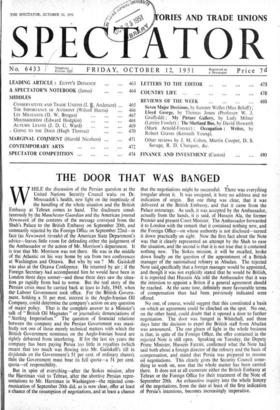THE DOOR THAT WAS BANGED
HILE the discussion of the Persian question at the United Nations Security Council waits on Dr. Moussadek's health, new light on the ineptitude of the handling of the whole situation and the British Embassy at Tehran comes to hand. The disclosure simul- taneously by the Manchester Guardian and the American journal Newsweek of the contents of the message conveyed from the Shah's, Palace- to the British Embassy on September 20th, and summarily rejected by the Foreign Office on September 22nd—in face (as Newsweek reveals) of the American State Department's advice—leaves little room for defending either the judgement of the Ambassador or the action of Mr. Morrison's department. It is true that Mr. Morrison was not there. He was in the middle of the Atlantic on his way home by sea from two conferences at Washington and Ottawa. But why by sea ? Mr. Gaitskell was also at the Ottawa Conference. He returned by air • if the Foreign Secretary- had accompanied him he would have been in London three days sooner—and those three days saw the situa- tion go rapidly from bad to worse. But the real story of the Persian crisis must be carried back at least to July, 1945, when the-Labour Government took office. For the British Govern- ment, holding a 51 per Bent. interest in the Anglo-Iranian 011 Company, could determine the company's action on any question of major policy. That is the complete answer to a Minister's talk of " British Oil Magnates " or journalistic denunciations of "Sterling Imperialism." The question of financial relations between the company and the Persian Government was mani- festly not one of those merely technical matters with which the British Government nominees on the Anglo-Iranian board are rightly debarred from interfering. If for the last six years the company has been paying Persia too little in royalties (which meant that too much was flowing into Mr. Gaitskell's till in dixidends on the Government's 51 per cent. of ordinary shares), thin the Government must bear its full quota—a 51 per cent. quota—of responsibility.
But in spite of everything—after the Stokes mission, after the Harriman visit to Tehran, after the- abortive Persian repre- sentations to Mr. Harriman in Washington—the rejected com- munication of September 20th did, as is now clear, offer at least a chance of the resumption of negotiations, and at least a chance that the negotiations might be successful. There was everything irregular about it. It was unsigned, it bore no address and no indication of origin. But one thing was clear, that it was delivered at the British Embassy, and that it came from the Palace entourage. As such, it was accepted by the Ambassador,, actually from the hands, it is said, of Hussein Ala, the former Premier and present Court Minister. The Ambassador forwarded it to London with the remark that it contained nothing new, and the Foreign Office—on whose authority is not disclosed—turned it down practically on sight. Now the first fact about the Note was that it clearly represented an attempt by the Shah to ease the situation, and the second is that it is not true that it contained nothing new. The Stokes mission, it will be recalled, broke down finally on the question of the appointment of a British manager of the nationalised refinery at Abadan. The rejected Note said,specifically that a foreign manager would be appointed, and though it was not explicitly stated that he would be British, it is reported that Hussein Ala told the Ambassador that it was the intention to appoint a Briton if a general agreement should be reached. At the same time, definitely more favourable terms of compensation than had been, previously indicated were offered.
No one, of course, would suggest that this constituted a basis on which an agreement could be clinched on the spot. No one, on the other hand, could doubt that it opened a door to further negotiation. The door was banged in Whitehall, and three days later the decision to expel the British staff from Abadan was announced. The one gleam of light in the whole business is that, in spite of the Foreign Office, the offer contained in the rejected Note is still open. Speaking on Tuesday, the Deputy Prime Minister, Hussein Fatemi, confirmed what the Note had said both about a foreign director of the refinery and the basis of compensation, and stated that Persia was prepared to resume oil negotiations. This clearly gives the Security Council some- thing to work on, now that the whole matter has been carried there. It does not at all exonerate either the British Embassy at Tehran or the Foreign Office for their treatment of the Note of September 20th. An exhaustive inquiry into the whole history of the negotiations, from the date at least of the first indication of Persia's intentions, becomes increasingly imperative.


































